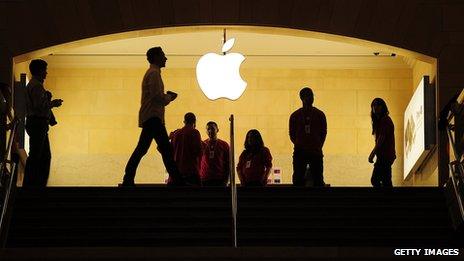App Store 'full of zombies' claim on Apple anniversary
- Published

While some apps generate millions for developers, most are rarely downloaded
Apple's App Store is populated by many "zombie" programs which get next-to-no downloads, new research suggests.
Figures seen by the BBC from tracking service Adeven indicate over two-thirds of apps in the store are barely ever installed by consumers.
However Apple has said that 90% of all apps in the marketplace - which is marking its five-year anniversary - are downloaded at least once a month.
Apple boss Tim Cook said the store had "fundamentally changed the world".
Speaking to app developers at the firm's recent developer's conference, the chief executive said: "Customers love the buying experience and they love your incredible apps. And they have now downloaded 50 billion apps.
"That's a lot of zeros and a truly staggering number."
'Very small'
But according to Adeven the size of the US firm's app store, which has about 900,000 products, has left many developers struggling to get noticed.
"579,001 apps out of a total of 888,856 apps in our database are zombies," the analytics firm said.
It defines zombies as apps which never appear in any of the thousands of charts published by Apple which are tracked on a daily basis. These cover different categories, price and other criteria for each country's version of the store.
"We call the apps that hold no position anywhere in the world zombies because they do not generate a significant amount of downloads to sustain their further development," explained Paul Muller from Adeven.
"We can't say exactly how many downloads they have - Apple doesn't reveal this - but it is very small.
"They may still receive a couple of downloads every day - maybe even up to 100 or so - but that is not going to be enough for a developer to capitalise on or draw motivation from to support the app."
Adeven's research follows on from another survey conducted by Pew Research Center's Internet & American Life Project.
It indicated that some 68% of smartphone owners used five or fewer apps on a weekly basis, with many of their other "impulse" buys losing their appeal almost instantly.
App developer Malcolm Barclay told the BBC that the amount of "zombie" apps was not a surprise - but argued that there was "safety in numbers".
"There's a lot of apps in the store that are not downloaded for good reason, they're awful.
"It's about making yourself attractive. If you have an attractive application that does what it sets out to do, Apple will help it get noticed."
Paolo Pescatore, director of apps and media at CCS Insight, said developers faced visibility issues across all platforms, not just with Apple's store.
"We track the top apps being downloaded from all the major app stores and it's always the same names.
"We very rarely see new players breaking through. They face a monumental challenge."
Influence
Zombies aside, the launch of the App Store in 2008 is widely regarded as a game-changing moment for how we consume technology.
It has inspired other companies to follow suit, with Google, Microsoft and Blackberry among those to have launched their own stores.
Apple says it has paid out $10bn (£7bn) to app developers - three times more, it boasts, than all the other app stores combined.
The "app economy", as it has become known, has also been responsible for disrupting the video games industry.
Companies such as EA have shifted to offering downloads of many of their titles for free, and make money through in-app sales of power-ups and other add-ons.
Those that do charge an upfront fee are still relatively cheap.
In particular, the popularity of Rovio's Angry Birds - which has made millions through franchising and merchandise sales - has made some games publishers consider if the established model of charging £30 or more for console and PC titles could become a thing of the past.
Even so, the development has not been without controversy.
Apple, which takes a 30% cut of all sales through its online marketplace, was recently forced to offer refunds to parents who had found themselves facing unexpected bills as a result of in-app purchases by their children.
Follow Dave Lee on Twitter @DaveLeeBBC, external
- Published9 July 2013
- Published25 August 2011
- Published10 June 2013
- Published31 May 2013